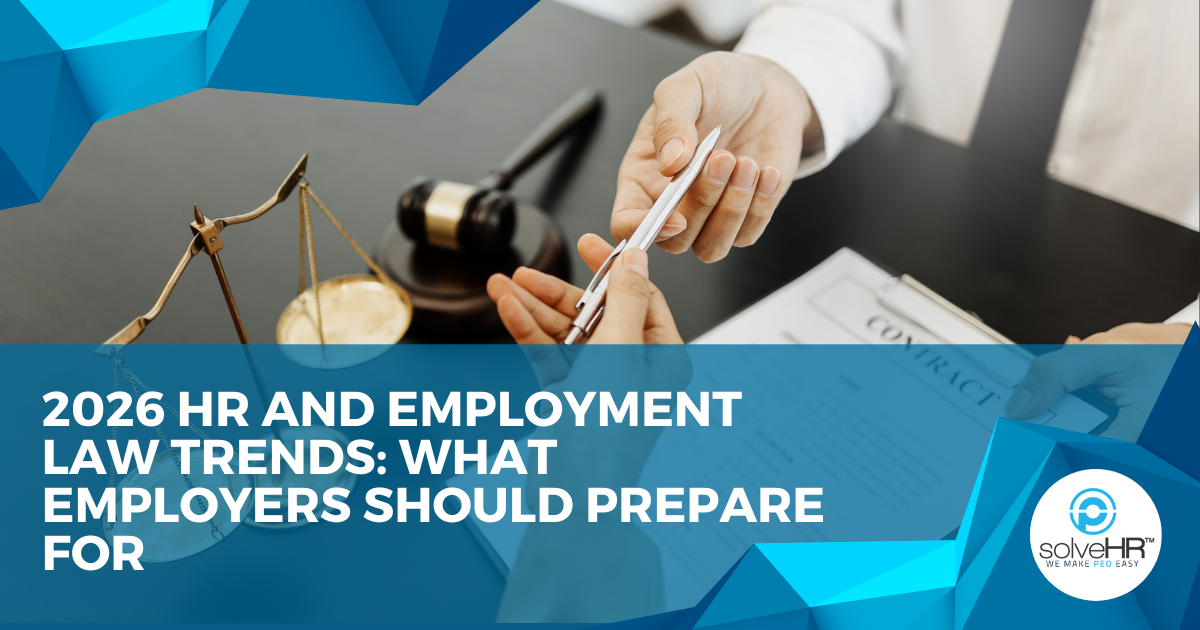2026 HR and Employment Law Trends: What Employers Should Prepare For

As we approach the new year, businesses are looking ahead to the changes that 2026 may bring in HR practices and employment law. Staying informed and proactive is essential to navigating these shifts effectively and keeping your company competitive and compliant. At SolveHR, we monitor these trends closely to help clients anticipate new requirements, adapt to evolving employee expectations, and prepare for compliance changes.
Key HR and Employment Law Trends for 2026
- Increased Focus on Employee Well-being and Work-Life Balance
- What It Means: Employee well-being has been at the forefront in recent years, but 2026 is expected to see even greater emphasis on policies that support mental health, stress management, and work-life balance. This trend includes expanded wellness programs, mental health resources, and flexible work options.
- Preparation Tip: Consider enhancing mental health support in your benefits package or offering flexible work policies that promote work-life balance. SolveHR can help review and implement well-being initiatives that align with your company’s goals and budget.
- Expanded Family and Caregiver Support Benefits
- What It Means: With a growing focus on supporting employees’ diverse family needs, more businesses are offering paid family leave, caregiver benefits, and resources for working parents.
- Preparation Tip: Evaluate whether additional caregiver support options, such as eldercare assistance or extended parental leave, might be feasible and beneficial for your workforce. SolveHR can guide you in assessing employee needs and integrating family-friendly benefits into your offerings.
- Rise of “Skills-Based Hiring”
- What It Means: Skills-based hiring, or hiring based on a candidate’s demonstrated skills rather than specific degrees or previous job titles, is becoming a major trend. This approach helps companies tap into a more diverse talent pool and respond to evolving skills needs.
- Preparation Tip: Begin transitioning toward skills-focused job descriptions and assessments. SolveHR can help create job listings and interview questions that emphasize relevant skills, helping you attract a wider range of qualified candidates.
- Continued Emphasis on DEI (Diversity, Equity, and Inclusion)
- What It Means: DEI remains a priority, with an increased focus on transparency, equitable pay practices, and creating inclusive workplace cultures. Employers may also see more requirements around pay transparency and DEI reporting.
- Preparation Tip: Conduct a pay equity audit and review your DEI policies to ensure they meet current standards. SolveHR can help identify gaps and recommend strategies to strengthen your DEI practices in line with regulatory changes.
- Evolving Data Privacy and Cybersecurity Requirements
- What It Means: Data privacy and cybersecurity are becoming central to HR practices, especially regarding employee data protection and compliance with new privacy laws. As more businesses adopt remote work and digital HR tools, maintaining secure data handling processes is essential.
- Preparation Tip: Review your data privacy and cybersecurity protocols to ensure compliance and protect employee data. SolveHR can assist with implementing secure data management solutions and keeping up-to-date with new privacy regulations.
- Growth in the Use of AI and Automation in HR
- What It Means: AI is transforming HR processes, from recruitment to performance evaluations. However, the increased use of AI brings new considerations around bias, transparency, and compliance with equal opportunity laws.
- Preparation Tip: Evaluate which AI-driven tools could improve your HR processes, and ensure that any technology used is transparent, fair, and compliant with anti-discrimination laws. SolveHR can help assess AI tools and create guidelines to minimize bias and improve overall efficiency.
Best Practices for Preparing for 2026 Employment Law Changes
- Stay Updated on New Legislation and Compliance Requirements
- Why It’s Important: Employment laws at the federal, state, and local levels are continually evolving, with new mandates often announced with little lead time. Regularly reviewing legal updates helps you stay prepared.
- SolveHR Tip: Schedule quarterly check-ins to review new legislation and ensure your policies are current. SolveHR can provide regular updates and guidance on upcoming laws that impact your business.
- Conduct Regular Policy Audits
- Why It’s Important: A proactive policy review helps you spot gaps and areas for improvement before compliance issues arise. Audits also help ensure that your policies reflect current best practices and employee expectations.
- SolveHR Tip: Conduct an annual HR policy audit to identify areas needing revision. SolveHR can help review and update your policies in areas such as leave, harassment prevention, and data security.
- Engage in Workforce Planning and Skill Development
- Why It’s Important: Staying competitive in 2026 means adapting to emerging skills demands and preparing for shifts in workforce demographics. Workforce planning helps you anticipate talent needs and support employee growth.
- SolveHR Tip: Begin offering skill development programs, either through in-house training or external resources, to keep your team prepared for industry changes. SolveHR can assist with identifying skill gaps and developing targeted learning initiatives.
- Implement Transparent Communication with Employees
- Why It’s Important: Transparent communication builds trust and keeps employees informed of changes, particularly around topics like DEI, pay practices, and workplace policies.
- SolveHR Tip: Regularly share updates and policy changes with employees. SolveHR can help create clear, accessible communication materials to ensure employees are informed and engaged.
- Review Technology and Cybersecurity Needs
- Why It’s Important: As HR tech usage grows, so does the need for strong cybersecurity protocols to protect employee information. An up-to-date technology strategy also ensures efficiency and aligns with employee expectations for digital solutions.
- SolveHR Tip: Review your technology stack and cybersecurity measures to protect employee data and optimize operations. SolveHR can help you assess and select secure HR tools that align with your business goals.
How SolveHR Can Support Your Business Through 2026 Trends
SolveHR partners with businesses to address HR and compliance needs proactively, from policy audits to DEI planning and technology integration. Our team stays informed on HR trends and regulatory changes, offering clients insights and strategies to stay compliant and competitive. With our expertise, you can prepare for 2026’s evolving landscape and build a resilient, future-ready workforce.Preparing for the HR and employment law trends of 2026 ensures your business remains compliant, attractive to top talent, and equipped to handle new challenges. By understanding and responding to these trends, you can keep your workforce engaged, secure, and aligned with your company’s values. Contact SolveHR today to learn more about how we can support your 2026 strategy and help you navigate the road ahead.
Experience Hassle-Free Payroll Today
Request a demo to see our services in action!

